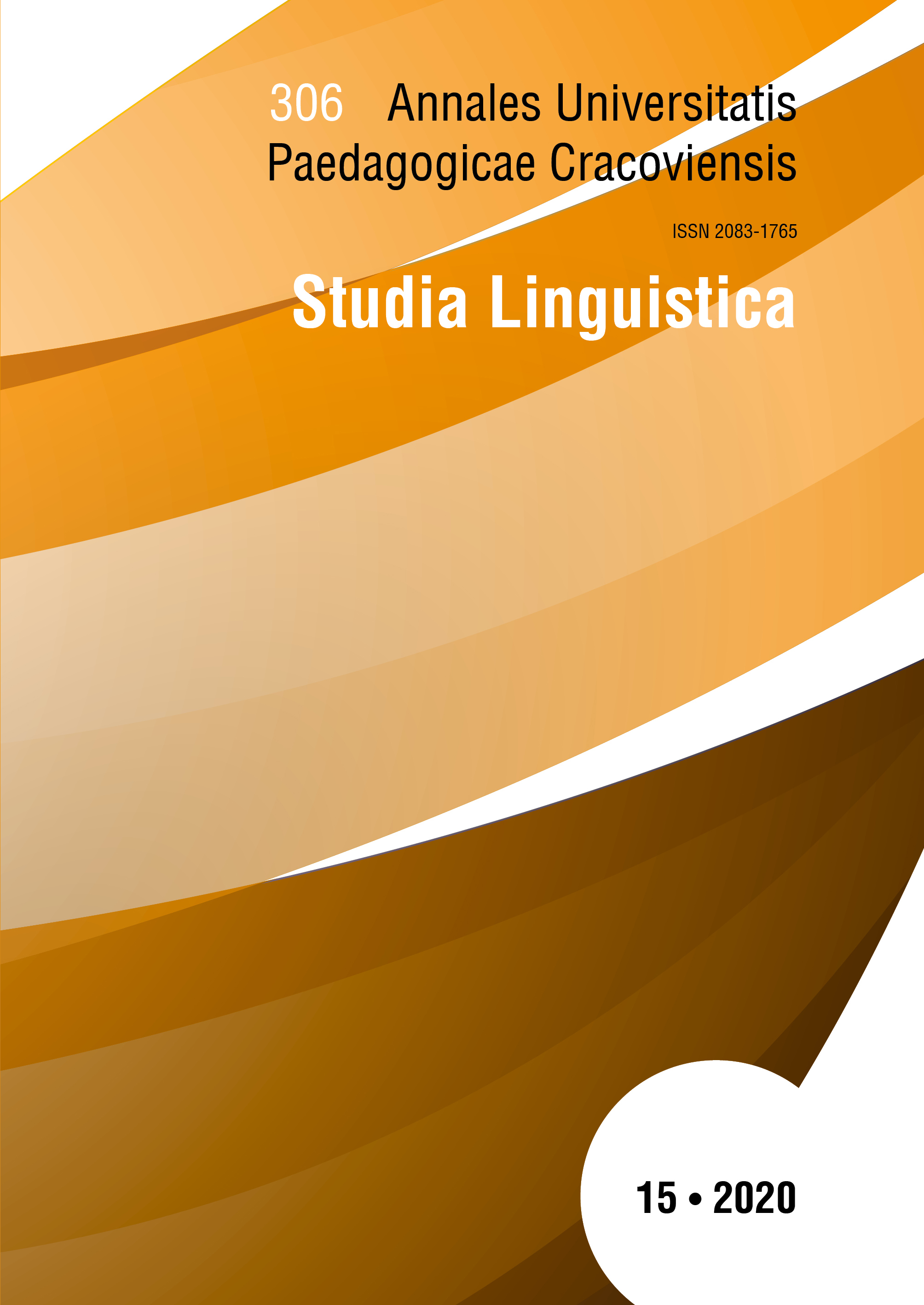Titles as Winged Words
Main Article Content
Abstract
The article discusses the issue of the “second life” of titles which, separated from the original text, start to function in the texts of other authors as winged words. The author has described the works that have been written on this topic based on the materials from magazines, belles-lettres and books discussing the titles of films. Twelve titles were presented which have been taken over by the authors of at least two new texts. The research material included ten Polish novels from the years 1969-2013. Twelve titles come from two poetic works, one song, five novels and two filmed stories, one light opera and one film. Six of them are the works of Polish authors, and the remaining six were made by foreign authors. A half of them were described in the volume Skrzydlate słowa [Winged Words] of 1990.
Downloads
Article Details
Author, submitting a text to the editorial board of the journal “Annales Universitatis Paedagogicae Cracoviensis. Studia Linguistica", certifies that the content of the article has not been published so far and that the work does not violate in any way the copyright or related rights of other person, as well as other rights of third parties, and that no one's rights to the work (or any part thereof) have been missed. After signing the contract, the property rights to the published materials are transferred to the University of the National Education Commission, Krakow.
“Annales Universitatis Paedagogicae Cracoviensis. Studia Linguistica” is an open access journal, and all its content is made available free of charge to users and institutions under the Creative Commons CC-BY-NC-ND 4.0 license (attribution, non-commercial use, no derivative works). Under this license, the authors agree that their work may be lawfully reused for any purpose, except for commercial purposes, without the prior consent of the author or publisher. Everyone can read, download, copy, print, distribute and process these works, provided that the author's marking and the original publication place are correct. Published texts may not be used to create derivative works (e.g. to translate and publish in another language without the consent of the publisher). This is in line with the BOAI (Budapest Open Access Initiative) definition. "Studia Linguistica" does not charge for submitting or processing articles.
References
Bartmiński J., Niebrzegowska-Bartmińska S., 2012, Tekstologia, Warszawa.
Google Scholar
Bąba S., 1970, Frazeologia potoczna w tytułach utworów literackich, „Poradnik Językowy”, z. 5, s. 320–325.
Google Scholar
Chlebda W., 1993, Frazematyka, [w:] Encyklopedia kultury polskiej XX wieku, t. 2: Współczesny język polski, red. J. Bartmiński, Wrocław, s. 327–334.
Google Scholar
Chlebda W., 2016, Tytuły we frazeograficznej perspektywie opisu, [w:] Perspektywy współczesnej frazeologii polskiej. Geneza dawnych i nowych frazeologizmów polskich, red. G. Dziamska-Lenart, J. Liberek, Poznań, s. 103–116.
Google Scholar
Danek D., 1980, Dzieło literackie jako książka. O tytułach i spisach rzeczy w powieści, Warszawa.
Google Scholar
Guz B., 2001, Język wchodzi w grę – o grach językowych na przykładzie sloganów reklamowych, nagłówków prasowych i tekstów graffiti, „Poradnik Językowy”, z. 10, s. 9–20.
Google Scholar
Ignatowicz-Skowrońska J., 2008, Frazeologizmy jako tworzywo stylu współczesnej powieści polskiej, Szczecin.
Google Scholar
Kosyl C., 1993, Chrematonimy, [w:] Encyklopedia kultury polskiej XX wieku, t. 2: Współczesny język polski, red. J. Bartmiński, Wrocław, s. 439–444.
Google Scholar
Kowalik K., 2019, Próba typologii tytułów (ideonimów) prozy Jana Wiktora, „Annales Universitatis Paedagogicae Cracoviensis. Studia Linguistica” XIV, s. 96–107.
Google Scholar
Koziara S., 2005, Uwagi w sprawie źródeł oraz selekcji zasobu polskich frazeologizmów biblijnych, „Problemy Frazeologii Europejskiej” VII, s. 39–49.
Google Scholar
Lewicki A.M., Pajdzińska A., 1993, Frazeologia, [w:] Encyklopedia kultury polskiej XX wieku, t. 2: Współczesny język polski, red. J. Bartmiński, Wrocław, s. 307–326.
Google Scholar
Miodek J., 1981, Tytuł w tytule jako środek stylistyczny, „Rozprawy Komisji Językowej WTN” XII, s. 121–129.
Google Scholar
Nowakowska B., 2005, Nowe połączenia wyrazowe we współczesnej polszczyźnie, Kraków.
Google Scholar
Pisarek W., 1966, Tytuł utworu swoistą nazwą własną, „Zeszyty Naukowe WSP w Katowicach. Prace Językoznawcze” III, s. 67–81.
Google Scholar
Połowniak-Wawrzonek D., 2010, Wpływ mediów na współczesną polską frazeologię, Kielce.
Google Scholar
Rudnicka-Fira E., 1981, Nazewnictwo w „Dziadach” Adama Mickiewicza, „Język Artystyczny”, t. 2, s. 145–170.
Google Scholar
Skowronek K., Skowronek B., 2003, Ideonimy polskich filmów fabularnych (1947–2002), [w:] Metodologia badań onomastycznych, red. M. Biolik, Olsztyn, s. 610–628.
Google Scholar
Smoleń-Wawrzusiszyn M., 2016, „Nieznośna lekkość bytu” – skrzydlate słowa w retorycznych interpretacjach, „Białostockie Archiwum Językowe”, nr 16, s. 265–283.
Google Scholar
Ślawska M., 2008, Tytuł – najmniejszy tekst prasowy, „Rocznik Prasoznawczy”, t. 2, s. 117–126.
Google Scholar
Tyrpa A., 2016, Źródła reproduktów w powieściach Moniki Szwai, [w:] Perspektywy współczesnej frazeologii polskiej. Geneza dawnych i nowych frazeologizmów, red. G. Dziamska-Lenart, J. Liberek, Poznań, s. 135–157.
Google Scholar
Wojnowska J., 2008, Cechy i funkcje tytułu w tekście publicystycznym na przykładzie felietonów J. Hennelowej i J. Podsiadły, „Język Polski” LXXXVIII, s. 29–38.
Google Scholar
